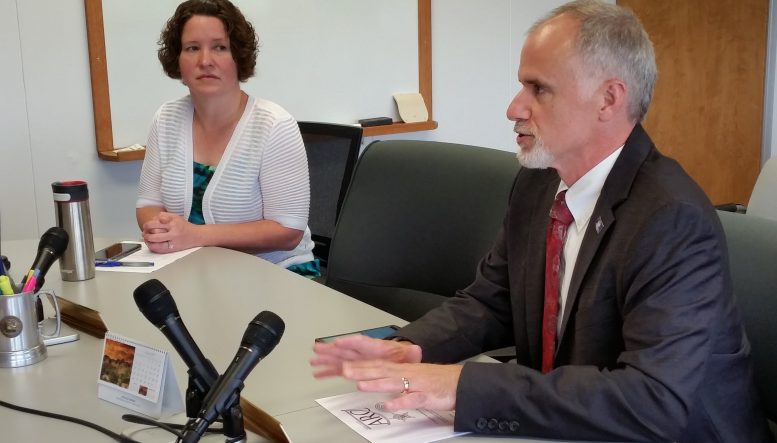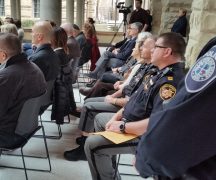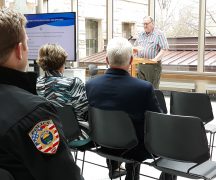By JAN LARSON McLAUGHLIN
BG Independent News
Fighting the opioid crisis can be like aiming at a moving target. Drugs get more potent, people are prone to relapse, and some proposed laws work against success.
But it appears that Wood County’s Addiction Response Collaborative is having an impact.
“We’re making inroads,” Wood County Prosecuting Attorney Paul Dobson told the county commissioners Tuesday morning.
In the six months that the ARC has been up and running, the program has been alerted to 80 individuals who have overdosed. “Some of those have overdosed multiple times,” Dobson said.
Of those 80, five died.
While tragic, that number is far less than the 16 people who died of opiate overdoses in 2016 in Wood County.
The ARC team, made up of Belinda Brooks and Det. Sgt. Ryan Richards, had contact with the 75 addicts who overdosed, three of whom refused help.
Of the addicts, 55 cases were referred to ARC by law enforcement officers, and 22 were referred by family members.
“Those are great numbers,” Dobson said of those referred by family. That means the word is getting out to more than just law enforcement. “I was pleasantly surprised. People are contacting the program.”
Of those working with the ARC program, four overdosed a second time and are currently in treatment.
“That’s a great number when you’re talking about 75 people.”
The ARC Quick Response Team responds to overdose incidents and other addiction-related incidents and calls. The team initiates a conversation with the survivor and family members. The goal is to encourage and offer assistance in obtaining treatment and counseling through multiple local behavioral health providers.
During the past six months, Brooks and Richards have made 611 contacts with the 75 addicts – following up with them, encouraging them, looking for any gaps in the services, Dobson said.
In addition to the Quick Response Team, the program works with programs in the court system, including a diversion program, analyzing the current intervention process being used by the court and the implementation of a court docket specific to addiction.
Initially, some of the law enforcement offices in the county were suspect of working with the ARC.
“There was more law enforcement resistance,” Dobson said. Some police agencies feared the ARC would take over cases. “That’s not our intention. We step in with ‘What can we do to help?’”
In fact, Richards often shares information that he has collected from addicts with local law enforcement about how the drugs were accessed.
Local judges have included ARC involvement as a probationary requirement, Dobson said.
And Brooks and Richards have spoken at schools and town hall meetings to educate the public about the program.
Wood County Commissioner Ted Bowlus praised the work of the program.
“Without the ARC, who knows how many people would have overdosed,” he said.
Bowlus noted the increased potency of some opioids.
“You’re fighting a more difficult battle now,” he said. “Your success sounds very good.”
Despite efforts, nationwide drug overdose deaths are expected to rise this year by 10 percent, Dobson said.
“I believe that collectively we’re making a lot of inroads,” he said. “I think we’re doing an excellent job combatting this from both sides of the aisle.”
Dobson acknowledged the challenges – such as the growing trend that dealers target addicts who attend therapeutic groups, trying to hit them in their weakened states.
“We’re fighting an industry,” he said.
If that weren’t enough, Dobson cautioned the commissioners about an issue appearing on the November ballot that has the potential of causing havoc for opiate programs in Ohio.
State Issue 1 would reduce all drug possession offenses to misdemeanors – no matter the quantity of the drug involved. It would not allow jail sentences for initial drug possession charges.
That works against efforts to help people get clean, Dobson said.
“We’ve asked the courts to place people in jail to save their lives,” he said.
This change would make addicts more vulnerable. “We’ve cleaned them up just enough to make them a target and a potential fatality.”
Dobson said State Issue 1 is being proposed by well-intentioned people, who don’t have the experience to know that it would hurt rather than help opiate addicts.
“It’s certainly not what it says it is,” Dobson said. “It’s a tremendous concern.”





